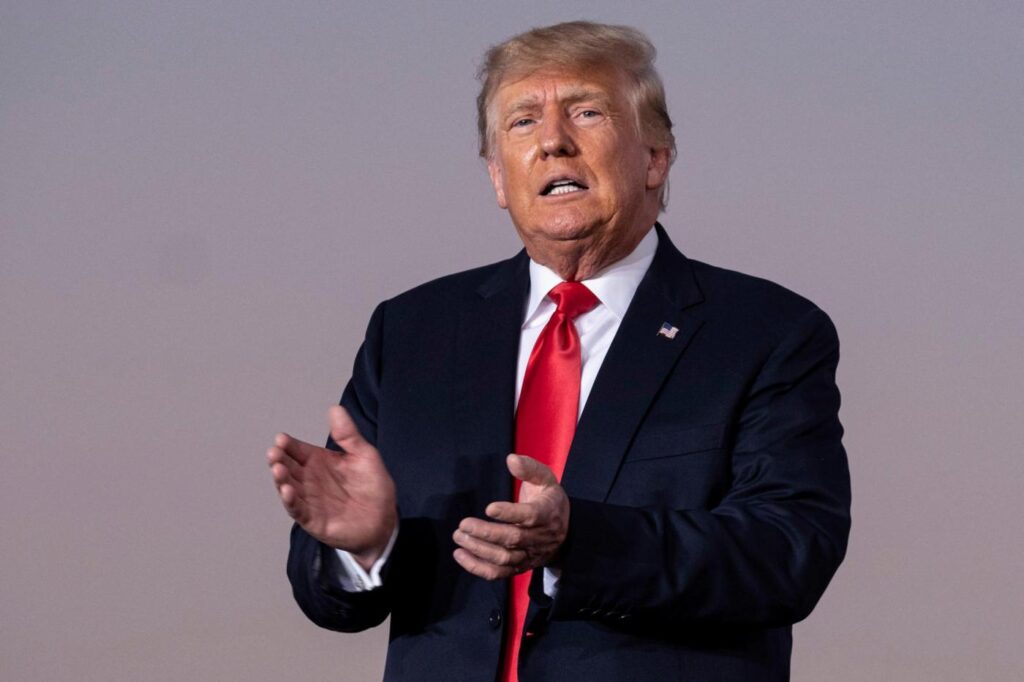
By MICHAEL R. SISAK
NEW YORK (AP) — New York’s attorney general is seeking former President Donald Trump’s testimony in an ongoing civil investigation into his business practices, a person familiar with the matter said.
Attorney General Letitia James’ office has requested that Trump sit for a deposition on Jan. 7, according to the person, who spoke on condition of anonymity because of the ongoing investigation.
The news was first reported by The Washington Post.
Trump’s representatives did not immediately response to requests for comment. A message seeking comment was left with Trump’s lawyer, Ronald Fischetti. James’ office declined to comment.
A spokesperson for the Manhattan district attorney’s office, which is conducting a parallel criminal investigation into Trump’s business dealings, said Thursday that the interview request “is not part of the criminal investigation.”
In the past, the Republican ex-president has decried the investigations as part of a “witch hunt.”
James, a Democrat, has spent more than two years looking at whether Trump’s company, the Trump Organization, misled banks or tax officials about the value of assets — inflating them to gain favorable loan terms or minimizing them to reap tax savings.
Requesting Trump’s testimony is a first step in a process that could eventually lead to issuing a subpoena and going to a judge to order him to cooperate if he were to refuse.
James had announced a run for New York governor in late October, but on Thursday, she suspended that campaign and cited ongoing investigations in her decision to instead seek reelection as state attorney general.
James’ investigators last year interviewed one of Trump’s sons, Trump Organization executive Eric Trump, as part of the probe. James’ office went to court to enforce a subpoena on the younger Trump and a judge forced him to testify after his lawyers abruptly canceled a previously scheduled deposition.
Although the civil investigation is separate from Manhattan District Attorney Cyrus Vance Jr.‘s criminal investigation, James’ office has been involved in both. Earlier this year, Vance gained access to the longtime real estate mogul’s tax records after a multiyear fight that twice went to the U.S. Supreme Court.
Vance, who is leaving office at the end of the year, recently convened a new grand jury to hear evidence as he weighs whether to seek more indictments in the case, which resulted in tax fraud charges in July against the Trump Organization and its longtime CFO Allen Weisselberg.
Weisselberg has pleaded not guilty to charges alleging he and the company cheated tax authorities with lucrative, untaxed fringe benefits. He is due back in court next July.
Asked about the status of the criminal probe, Vance said last week: “I think it’s pretty clear that our investigation is active and ongoing.”
Both investigations are at least partly related to allegations made in news reports and by Trump’s former personal lawyer, Michael Cohen, that Trump had a history of misrepresenting the value of assets.
James’ office issued subpoenas to local governments as part of the civil probe for records pertaining to Trump’s estate north of Manhattan, Seven Springs, and a tax benefit Trump received for placing land into a conservation trust. Vance later issued subpoenas seeking many of the same records.
James’ office has also been looking at similar issues relating to a Trump office building in New York City, a hotel in Chicago and a golf course near Los Angeles. Her office also won a series of court rulings forcing Trump’s company and a law firm it hired to turn over troves of records.
In October, Trump testified under oath behind closed doors for several hours during a deposition in a lawsuit brought by protesters who say his security team roughed them up in the early days of his presidential campaign in 2015.
Trump had faced a Dec. 23 deadline for questioning in former “Apprentice” contestant Summer Zervos’ defamation lawsuit against him, but she dropped the case last month.
Trump was less cooperative with special counsel Robert Mueller’s probe of Russian election interference.
Mueller’s team of investigators sought an interview with Trump for months and though Trump, at times, stated publicly that he was willing to sit down with them, his lawyers long resisted the overture.
Instead, Trump’s lawyers in November 2018 submitted written responses on certain topics that Mueller’s team regarded as “inadequate.” Prosecutors in that matter decided against subpoenaing Trump to compel his testimony.
___
Associated Press reporters Jill Colvin in New York and Eric Tucker in Washington contributed to this report.
___
Follow Michael Sisak on Twitter at twitter.com/mikesisak
